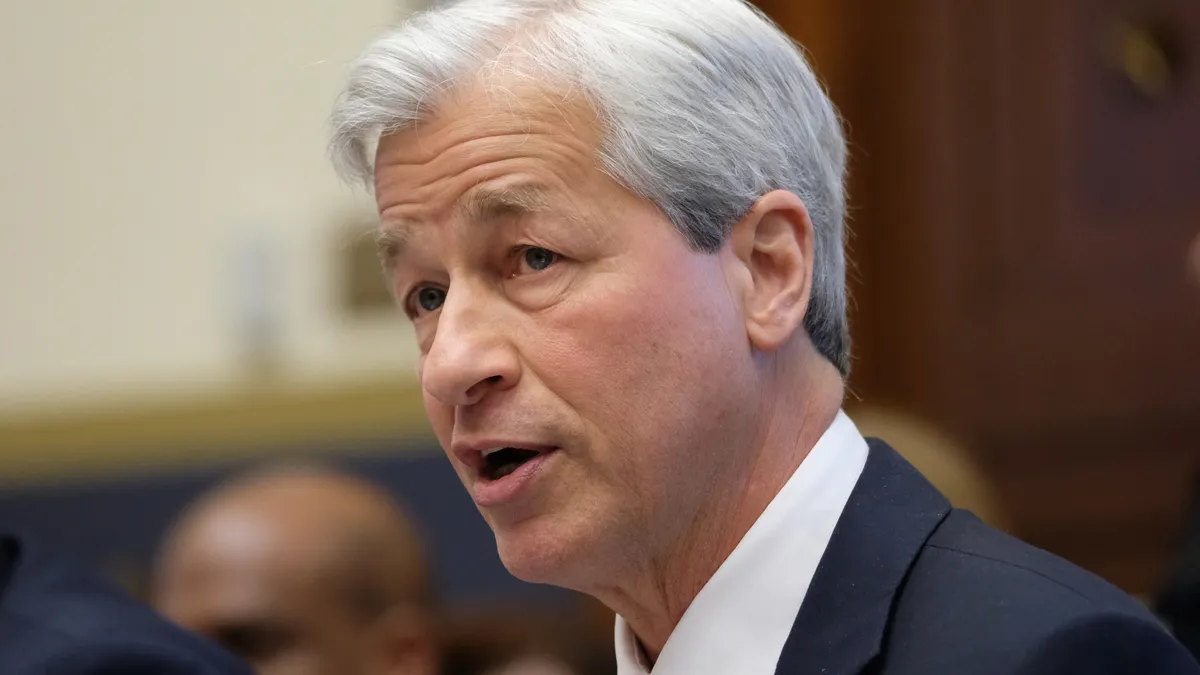Dive Brief:
- JPMorgan Chase paid CEO Jamie Dimon $34.5 million last year, according to a Securities and Exchange Commission filing Thursday. That’s the same level of compensation he received in 2021.
- JPMorgan’s board “committed to not grant any special awards to [Dimon] in the future,” it said Thursday — a nod to the $52.6 million share-options package the bank offered him in 2021. Shareholders sent a strong rebuke, giving the measure just 31% support last May, but the vote was nonbinding — meaning the bank could pay it anyway.
- Dimon’s compensation breaks down to a $1.5 million salary, a $5 million cash bonus and $28 million in restricted stock with value that can vary based on performance metrics. In Dimon’s case, the key metric is the bank’s return on tangible common equity. JPMorgan achieved 18% ROTCE last year, surpassing its goal of 17%.
Dive Insight:
With his compensation unchanged from 2021, odds are good that Dimon will maintain his standing as the third-highest-paid CEO among the six largest U.S. banks. He had been the best-compensated for several years running — until 2021, when he was leapfrogged by Morgan Stanley’s James Gorman and Goldman Sachs’ David Solomon, who each made $35 million that year.
Thursday’s pay package caps a year in which profits at JPMorgan fell by 22% to $37.7 billion. That was still high enough to rank second all-time at the bank, after 2021. Revenue at JPMorgan climbed to $132.3 billion — a fifth straight annual record for the bank, the company said. JPMorgan’s stock price suffered, however — dropping 15% throughout 2022, the steepest yearly fall since 2011.
“Amid the significant challenges of strong competition, growing geopolitical tensions, global economic uncertainty, mounting inflation and higher rates, and the lingering impacts of COVID-19, under Mr. Dimon's stewardship, the Firm continued to serve its clients and customers around the world during a time of unprecedented business demands,” JPMorgan said in a statement Thursday. “The Board continues to recognize that the Firm is in a uniquely fortunate position to be led by such a highly talented and experienced executive.”
In determining Dimon’s compensation, the board said it considered JPMorgan’s performance throughout the COVID-19 pandemic and recovery, as well as “feedback from investors at the 2022 annual meeting” — possibly another reference to blowback over one-time executive payouts.
JPMorgan’s decision to hold off on further “special awards,” however, could also indicate Dimon, who is 66, may leave his post in less than the five years it would take for such an incentive to vest.
JPMorgan is the first of the six biggest U.S. banks to file executive compensation information this year with the SEC. If Morgan Stanley and Goldman Sachs were using Dimon’s compensation as a jumping-off point to pay Gorman and Solomon more for 2021, they wouldn’t have motivation to give those CEOs further raises now. Such a move may also be seen as poor taste, given that Morgan Stanley and Goldman Sachs have each announced headcount reductions within the past month and a half.














